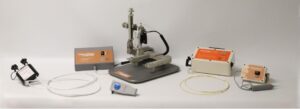By Timothy Kelly

The home of the CIMP-3D Lab. Research at Penn State has been the foundation of many local high tech and deep tech start-ups. Photo: T. Kelly
The S&P 500 is down 8.5% in the last six months. The gross domestic product percentage change from the preceding quarter was negative in the first two quarters of the year. A group of subject matter experts on the economy, The Conference Board, forecasts that “economic weakness will intensify and spread more broadly throughout the U.S. economy in the second half of 2022, and expects a recession to begin before the end of the year. Bloomberg reported in February 2022 that, over the previous nine months Meta, Apple, Microsoft, Tesla and Amazon had lost a combined $880 billion in market capitalization. And MarketWatch reported on Aug. 31 that “we continue to believe we are entering the worst semiconductor downturn in a decade given the recession and inventory build.”
It’s not the prettiest picture. So where does Happy Valley fit in?
How does the national economic situation impact Happy Valley businesses?
Penn State is the largest employer in Happy Valley, impacting about 60% of the employment base. That’s up from about 40% two decades ago. Undeniably, Penn State has a large positive impact on the Happy Valley economy.
Todd Erdley, founder, chairman and president of Videon, said, “there is a group of companies that prosper from the money spun off by Penn State. And that’s … a fundamental truth of this area. And so, there is a level of immunity to perturbations … or protection in that sense.”
“Private equity has a much greater opportunity to come into this area with purpose, because private equity looks well on companies that have a commitment to a bottom-line outcome and a logical growth plan. We’re very good at that in this area.”
However, once companies move out from beneath Penn State’s umbrella of protection and do business with the wider world, the national economy does play a larger role. Erdley said industries here “rely on customers on a worldwide basis.” He also noted if companies “look beyond central Pennsylvania to also have venture money or private equity money,” then ownership and influence come from outside the area. Erdley concluded, “Everybody is challenged to a degree.”
Don McCandless, CEO of ConidioTec LLC, said “Fuel prices, food prices, inflation, anything that affects the consumer ability to make discretionary purchases” will impact his customer’s business and therefore ConidioTec. He said that end users are likely to be “making decisions like… do I buy food or do I take care of the pests?”
Maureen Mulvihill, PhD, president and CEO of Actuated Medical, Inc. added, “The medical device industry, which tends to rely on mature chips, is only 1% of the overall market and therefore struggles to compete with other sectors that use chips. This, coupled with the pandemic and various supply chain disruptions, is leading to significant delays and disruptions in the delivery of life-saving medical devices.”
So, Happy Valley businesses aren’t immune from volatile economic turns, but they may have some resistance to the disease.
Fred Marroni, president and CEO of Indigo Biosciences, Inc. said, “In my experience, the region tends to not have the same level of volatility as other national areas. That being said, the region tends not to experience the aggressive growth… seen in other areas.”
Erdley added, “…there is an attitude with strategic venture capital … that State College is full of sleepy little companies that don’t represent hyper-growth to fund what … venture capital is really about. Private equity has a much greater opportunity to come into this area with purpose, because private equity looks well on companies that have a commitment to a bottom-line outcome and a logical growth plan. We’re very good at that in this area.” And it’s that commitment to healthy operating principles that stabilizes local businesses.
Along these same lines, the ability to respond to challenges is a strength for local companies. Mulvihill said, “Business leaders that could quickly evaluate the market and find a solution were able to keep their teams together and are still here… Actuated Medical, for example, realized the COVID PPE shortage and brought up an FDA compliant face shield manufacturing line in just seven days. During a six-month period, we shipped approximately 85,000 face shields.”
“There is a group of companies that prosper from the money spun off by Penn State. And that’s … a fundamental truth of this area. And so, there is a level of immunity to perturbations … or protection in that sense.”
What’s next?
Upcoming opportunities for local businesses, economic downturn or not, often lie in the nature of Happy Valley companies’ services or products.
Erdley said, “For Videon, it’s all about video streaming. And so, there are a couple things that are … fundamental truths: death, taxes and video … The consumption by the end consumer of wanting more and more video, and access to more and more video, is just continuing to explode.”

Some of Actuated Medical’s product line. Photo: Actuated Medical.
Similarly, Mulvihill said, “Actuated Medical has recently expanded into a 20,000-square-foot facility in Bellefonte. We are now offering specialized contract services to other companies. The diversification of revenue streams is key as our current products sales are limited by the backorder chips coming from China. Therefore, we are working on new designs with replacement components.”
Overall, while there are some business challenges beyond control, Happy Valley seems to be responding effectively to the available opportunities. It only helps that an affordable quality of life, excellent company cultures and strong industry fit together to create Happy Valley, making the region a continual great place to do business.
What economic impact is your company facing? How are you responding to those challenges? Do you have any guidance for newer companies? Send us an email and let us know!

